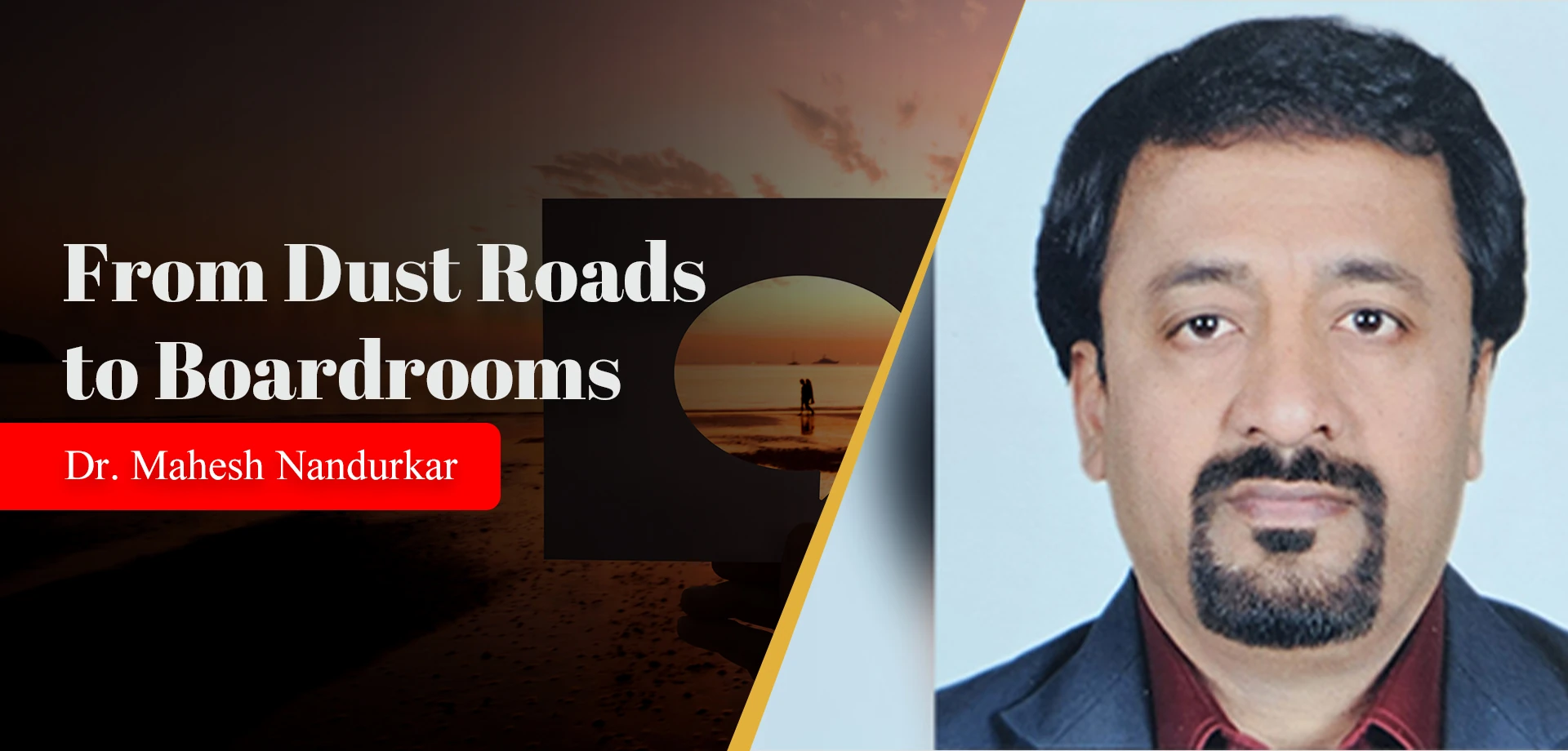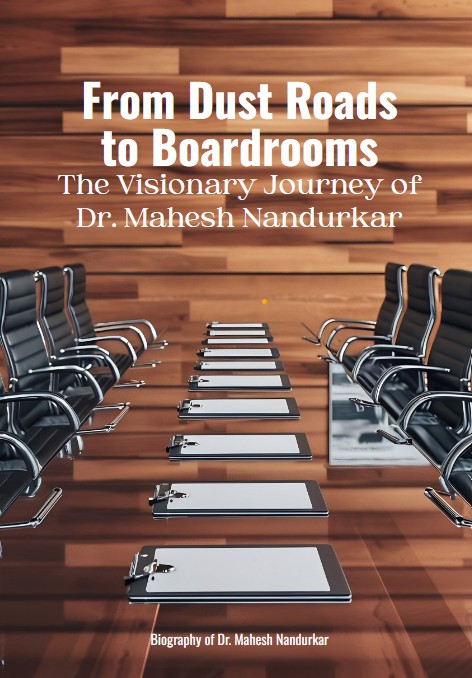

“Before a man builds industries, he must first build himself.”
Introduction
In the quiet corners of rural Maharashtra, where opportunity often arrives late — if at all — a young boy named Dr. Mahesh Nandurkar began a journey not defined by privilege, but by perseverance. His life would eventually span continents, lead corporations, and influence countless lives. But in the beginning, there were no accolades, no titles — only dirt roads, borrowed books, and a hunger to rise.
Born into a humble family in a region where access to education was a luxury, Dr. Mahesh Nandurkar’s early years were grounded in hard work, discipline, and cultural rootedness. His parents, though not financially affluent, were spiritually rich — instilling in him values of humility, ethics, and self-respect. His father’s daily routine began before sunrise and ended long after sunset — not because he had ambition for himself, but because he had a dream for his son.
As a child, Mahesh was quiet but observant. He studied not only his textbooks, but the people around him — the laborers, the teachers, the shopkeepers — absorbing lessons in character and effort that would one day become the foundation of his leadership style. His love for mathematics and mechanics emerged early, and by the time he reached high school, it was clear he wasn’t just a student — he was a thinker, a builder, and a future problem-solver.
Getting into an engineering college was not easy — not financially, not geographically, and certainly not socially. But Dr. Mahesh Nandurkar was undeterred. He studied late into the night, taught younger students to earn modest tuition money, and scored among the top percentile in the competitive entrance examinations. It wasn’t just academic brilliance — it was warrior-like resilience.
He completed his Diploma in Mechanical Engineering, navigating not only complex technical subjects but also the emotional complexities of being a small-town boy in an increasingly urban professional world. He learned how to blend in without losing his essence. While others sought shortcuts to climb faster, Mahesh committed to the slow, steady path of mastery.
Early in his career, he could have joined a secure government job or settled for comfort — but he chose instead to venture into the operational trenches of India’s industrial sector. He took on roles that weren’t glamorous, but that taught him how systems breathe, how organizations move, and how human beings respond under pressure. These weren’t jobs — they were labs of leadership.
Phase 1 : Foundations of Grit and Learning — The Roots That Refused to Settle
“Before success becomes a story, it must first survive the silence.”
In the vibrant and often challenging landscape of rural Maharashtra, where resources were scarce but resilience was abundant, a young Dr. Mahesh Nandurkar began laying the foundations of what would become one of the most inspiring leadership journeys of his time. Born into a modest middle-class family, his early life didn’t come with grand opportunities — but it was rich in values, discipline, and dreams.
From the outset, he was different. While others in the village saw education as a formality, Mahesh saw it as a mission. The school he attended had limited facilities. Classrooms were often shared; benches were broken; electricity was unreliable. But none of that deterred him. What others saw as limitations, he treated as training grounds. Every inconvenience was a teacher. Every struggle, a test.
At home, the environment was steeped in humility and hard work. His father, a principled man of few words, rose early every day to support the family — a silent example of what it means to live with purpose and dignity. His mother, despite managing household duties under constant pressure, never let Mahesh feel the weight of their financial limitations. Her strength wasn’t spoken — it was felt. These early role models shaped his inner compass. They taught him that hard work was non-negotiable, and integrity was non-transferable.
As a child, Mahesh was remarkably self-directed. He didn’t wait for instruction; he sought it out. While many students waited for tuition classes, he would borrow library books and teach himself. When classmates took breaks, he revised concepts. He wasn’t driven by competition. He was driven by clarity — the clarity that his future would only be as big as the effort he put in today.
One of the earliest signs of his determination came during his secondary education. With limited access to coaching, Mahesh self-studied his way to scoring among the top percentile in state-level examinations. And while others celebrated and settled, he moved to the next goal: getting into a reputed engineering institution.
Engineering colleges in India are notoriously competitive, especially for those from rural backgrounds. But Dr. Mahesh Nandurkar believed not in shortcuts, but in preparation. He crafted a study regimen that would rival military discipline — waking before dawn, revising before breakfast, and refusing to let a single day pass without measurable progress. His success wasn’t the result of a miracle. It was the predictable outcome of deliberate effort.
He got his Diploma purely on merit base in Mechanical Engineering and this is where his world truly began to expand. Surrounded by students from cities with stronger academic backgrounds and better exposure, Mahesh initially felt the gap — but never let it define him. Instead, he outworked everyone. While others were figuring out the syllabus, he was mastering it. He turned weakness into fuel. The language barrier, the cultural shift, the academic rigor — they didn’t break him. They shaped him.
Phase 2 : The Early Hustle — Engineering, Operations, and Breakthroughs
“You don’t grow by avoiding the grind — you grow by embracing it before anyone else does.”
After completing his mechanical engineering diploma, Dr. Mahesh Nandurkar stood at a familiar crossroads — one known to many Indian students, but mastered by very few. With job offers limited, familial responsibilities growing, and self-expectations sky-high, Mahesh made a decision that would set the rhythm for the rest of his professional life: he wouldn’t wait for opportunities — he would go out and build them.
His entry into the corporate world wasn’t glamorous. He didn’t walk into plush offices or tech parks. He entered the steel-breathing, grease-smeared world of industrial operations — shop floors, factory belts, and mechanical breakdowns. His first roles were foundational — managing shifts, inspecting machine wear, ensuring process compliance, and firefighting daily breakdowns. To many, this was “hard work” — to Dr. Mahesh Nandurkar, it was homework for greatness.
These early years taught him what no textbook ever could: that leadership begins with listening, that machines may malfunction but people are harder to recalibrate, and that systems without empathy collapse under pressure. He learned how factories breathe, how teams function under fatigue, and how quality depends as much on morale as on machines.
During this time, he developed a fascination with process optimization. He realized that minor tweaks — a faster inspection checklist, a restructured shift pattern, a clearer escalation protocol — could result in exponential improvement. While his peers focused on delivering the day’s targets, Mahesh looked upstream: Why was the bottleneck happening? What could be digitized? Could it be predicted before it repeated?
This systems-level thinking made him stand out. Supervisors noticed. Managers took note. Even seasoned workers began to seek him out for troubleshooting. He wasn’t just a floor engineer anymore — he had started becoming a quiet force of transformation.
One major turning point came when a high-value batch was delayed due to a repetitive equipment fault that had evaded standard root-cause analysis. While the team debated temporary fixes, Mahesh took initiative, working overtime to investigate beyond the surface-level symptoms. He identified a micro-variation in temperature sensitivity in one of the upstream stages — a detail missed by automation and undetected in historical logs. His report was not only precise, but it came with corrective actions, ROI projections, and future-proofing recommendations.
That single intervention saved the company lakhs in potential losses — and earned him his first real recognition beyond his team.
But even as he succeeded, he never settled. He knew he needed more than operational exposure to lead at scale. He began preparing for higher studies, choosing to pursue a Diploma in Business Management — not to escape engineering, but to elevate it to a strategic dimension.
Phase 3 : Leading in Complexity — From National Projects to Global Responsibility
“The weight of leadership is not in the decisions you make, but in the people who trust you to make them.”
By the time Dr. Mahesh Nandurkar entered the next phase of his career, the industry had already begun to whisper his name in boardroom discussions and strategic meetings. Known for his rare ability to simplify complexity and humanize operations, he was no longer just a high-performing manager — he was being trusted with missions that required both strategic sharpness and emotional stability.
He now stepped into roles that demanded not just execution, but vision — responsibilities that spanned across plants, cities, and eventually continents. The transition from national influence to global accountability was not a leap — it was a logical evolution for a man whose leadership style had always been about scaling through substance.
At this stage, Dr. Nandurkar took charge of large-scale manufacturing and operational ecosystems — setups involving multiple business units, high-capital investments, and tight international client relationships. He was tasked not just with running what already existed, but with reviving underperforming units, establishing new verticals, and aligning diverse teams under one cohesive purpose.
One of his early assignments during this phase involved heading operations for a complex, multi-location manufacturing network. These units were technically sound, but suffering from fragmentation — departments weren’t speaking to each other, quality cycles were delayed, and vendor inconsistencies were causing escalating cost pressures.
Instead of coming in as a ‘fixer,’ Dr. Mahesh Nandurkar came in as an integrator.
His first step was not to make cuts or changes — it was to listen. He held one-on-one meetings with line operators, floor managers, and even third-party vendors. He toured the facilities, walked the production lines, examined legacy systems, and observed team dynamics quietly. Where others would impose quick solutions, Mahesh chose to understand the story behind the dysfunction. But perhaps his most powerful move was cultural: he installed a culture of ownership. He shifted the narrative from “What went wrong?” to “What can we do better together?” Within a year, output had doubled, operational costs had reduced by over 15%, and employee engagement reached an all-time high.